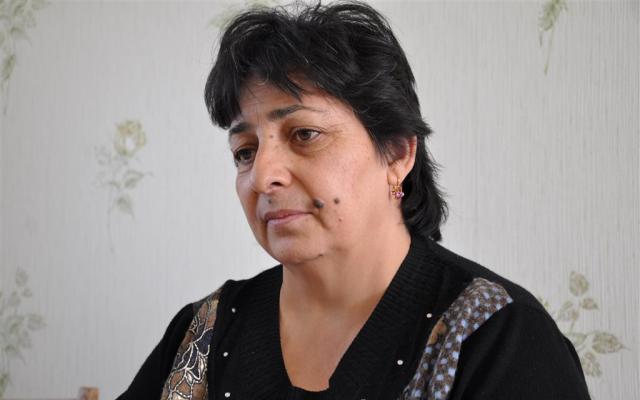
We were in our houses and the shooting started at 11pm. I thought this was normal; this had happened for four years, it usually lasted for two hours and then returned to normal. This time it was different, there was heavy bombardment from four sides, so we all went into the cellars.
My husband had left an hour before for another village where Armenians were attacking. We asked where he was going, he said: "I've faced this for four years and we're defending our motherland."
The firing continued until 3am, but my husband didn't return. We were three women and were told to leave, I said I'd wait for my husband, but they said we had to leave to save our honour. I thought the others didn't want to leave because of me, I thought I shouldn't make them sacrifice themselves, so I decided to leave.
We went to a half-finished building - there were a lot of people there. We stayed there for an hour and then we were told to get away; we had to leave some old men behind. Some young men told us to go through the forest.
It was cold and there was snow. We had to cross the river and everyone was wet. We got across and went through the forest for an hour; our clothes were frozen solid. I could hardly walk and had to leave my outer clothes behind. All those who could walk were in the forest.
We came to Nakhchivanly, an Armenian controlled village. There was a good road there and we saw a car with a siren. Five minutes later they started shooting at us; there was a huge noise. The snow was covered with blood. It was about 5 or 7am. We hid under bodies... We couldn't see anything then-there were just the bullets... When we got to Aghdam my sister washed our clothes which were wet with blood.
My father, Bahram Mustafayev was with me, he was 62 and had kidney problems. He had to walk barefoot. He survived, but never recovered and died 10 months later.
At 9am we were at Shelli village. Some men went into the forest to help people, even though they knew there was shooting. I waited three days for my husband; he didn't come. I stayed in Aghdam until 30 March, even though they were shooting holes in my sister's gate.
That night my husband went out to hold off the Armenians. Some of those who survived spoke about his bravery. He formed a self-defence team, asking them to save bullets. They had amateur weapons against a professional force, but they fought to the last bullet. Their actions delayed the Armenians and allowed people to reach the forests. But he was shot in the thigh and couldn't walk. He was captured and taken to Khankendi on 26 February.
There were some Ahiska Turks from Uzbekistan in Khojaly. One was a physical training instructor. On 8 March he told us not to worry, Alesker had been shot in the leg but he was alive, they had been in the same cell for eight days. But being a wounded hostage was worse than death. Then another man was returned and he said Alesker had died from loss of blood.
We got his body on 30 March, in ice in a plastic bag. I can't describe all of how he had been tortured. They had pulled out his teeth, both his arms were broken and his face was scarred. His parents wanted him to be buried in Lachin. Two months later, Lachin was occupied and now his body is hostage. He was declared a National Hero on 25 February 1997.
Interviewed by Ian Peart
Story source: Book “Khojaly Witness of a War Crime - Armenia in the Dock”,
published by Ithaca Press, London 2014
